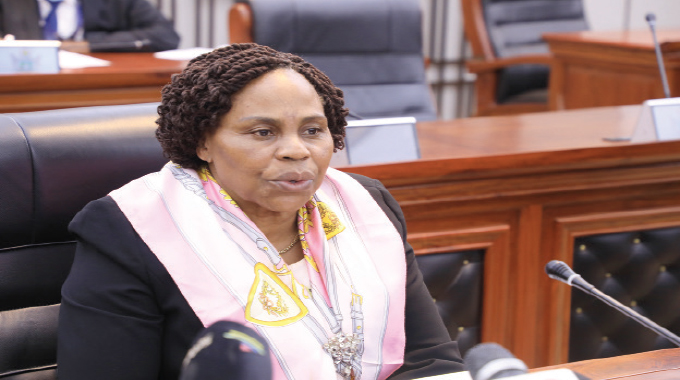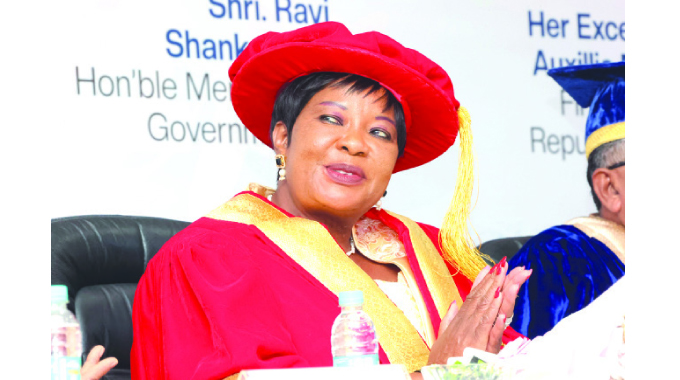
The Sunday News

Vincent Gono, Features Editor
AMPLIFYING community voices and enhancing democracy through a reconstruction of cultural identities where even minority societies are given representation through recognition of their languages has long been made a constitutional matter.
The Zimbabwean Constitution therefore, recognises 16 national languages. The Ministry of Information, Publicity and Broadcasting Services has however, been quick to move in the tide of creating an all-inclusive society through decolonising culture and untying it from an elitist colonial construction that sought subjugation of people’s culture.
The ministry has so far issued 14 community radio stations countrywide as a loud statement that the government is eager to empower its communities in line with the devolution agenda and in fulfilling the provisions of the Constitution on recognition of national languages.
It is also walking the talk in ensuring ‘no-one and no place is left behind’ in the national development discourse. It is therefore important to note that development as a multifaceted concept can best be achieved through use of national languages that inspires a better sense of belonging and commitment to duty in all developmental projects.
Not only that, product identity which is key in marketing dictates that labels on a multilingual fashion tells the story of the actual source of the products thereby raising the self-esteem of the people’s identity through such products.
In any production system, there is need for proper understanding and this can be made possible through the use of indigenous languages. In addition, language can be marketed as a product through theatre to the extent of contributing to the country’s Gross Domestic Product, tourism included. In a nutshell, indigenous languages through well packaged dances have a potential to attract both domestic and foreign tourists and partnership for the good of the country.
Buttressing the work of the Second Republic, Minister of Information, Publicity and Broadcasting Services, Senator Monica Mutsvangwa said the community radio stations should be used to promote sustainable development as well as local languages.
The radio stations are expected to amplify the people’s voices and broaden the public sphere from where national development is shaped. She said the new community radio stations should promote national languages, culture, development and should not lose sight of the rich historical narratives that speaks to the national realities.

Minister Monica Mutsvangwa
“To date, the Second Republic through the Ministry of Information, Publicity and Broadcasting Services has licensed 14 community radio stations. It brings joy to us to be able to give a voice to the marginalised and previously left out communities.
The aim of all the above-mentioned efforts is to make sure that we give voices to everyone in our country and to make sure that we leave no one and no place behind,” said Minister Mutsvangwa.
The idea where community radio stations are established in diverse and previously minority language territories mean a desire to preserve languages.
Language is an important marker that people use to identify themselves as belonging to a certain culture and to identify those who do not belong.
A language is a significant part of a person’s culture and cultural values and norms are often best expressed in a culture’s own language. Language therefore is an undoubted marker of one’s identity and the media play a role in ensuring that languages do not die in an effort to preserve identity and diversity through broadcasting in those languages.
The lack of expressive media had a serious identity creation effect in the country’s communities as people identified more with media products they were exposed to since identity is largely a social construct. Media therefore plays an important role in the socialisation of individuals and through the process of socialisation, identities are created and maintained.
Indigenous Knowledge Systems (IKS) expert and National Intangible Cultural Heritage Committee member, Dr Faith Sibanda said Government should invest a lot in issues of language and culture, especially to deal with the issue of negative attitudes.
“Some people still believe that when you mention the word “culture” you are already talking about demons and the devil. This is where we have missed the point. People need to be educated to know that, in most cases, even our behavior in these Christian churches is influenced by our culture.
“For instance, our ability to return tithes and offerings emanates from our cultural practice of paying tribute to kings which our forefathers used to do. It’s not a strange practice. I feel relieved that finally, government seems to be moving in the direction of empowering languages, it was long I overdue,” said Dr Sibanda.
He said there was need for a very vibrant attitude correction drive to make parents appreciate that English should come after the mother languages.
Dr Sibanda queried the logic of burdening ourselves doing activities in a foreign language we could do them straight from our languages.
“Countries like Japan, are on record for having decided to take drastic decisions such that all their development would be done in their local languages. Look at where they are right now!”
He said language and culture were intertwined and were a source of identity for a group of people. “If people lose their language, they lose their identity. Without identity, we are as good as dead,” he said.
“Our moral values, norms, beliefs are housed in the language. So, if anything, we would rather lose everything but remain with our languages because they will tell us where we are coming from and where we are going,” said Dr Sibanda.
African philosophy scholar Mr Joel Mukusha said priding one’s self in a foreign language was a clear form of mental colonisation as well as cultural suppression.
In this regard, he notes, Lawton (1982) posits that a curriculum is a selection from the society’s culture.
“Therefore, a society that selects languages which are far-fetched from the people’s culture especially from ECD level is absurd and in need of curricula exorcism. Learners understand better using their indigenous languages than when they are ‘jailed’ in a foreign language,” he said.
In addition, Mr Mukusha said Zimbabwe should continuously revisit its medium of instructions in the journey towards curriculum emancipation, freedom and independence.
“A plurality of language use in the dissemination of the curriculum content should be given urgency by the responsible ministries of education in Zimbabwe. However, a gradual well calculated and resource-based approach should be put in place from ECD going upwards in the mobilisation and implementation of the overall use of indigenous languages in Zimbabwe in order to avoid curriculum miscarriage.
“The human capital component should also be heightened so that there will be adequate teaching stuff for the linguistic Pan African indigenous language use in learning institutions, of course not totally doing away with other foreign languages which should be treated just as extra media of communication. The Tanzanian education system is a clear example where Kiswahili is respected as the official language,” he said.
Mr Mukusha added that it was quite significant for the African culture as it was expressed through the indigenous languages to form and sustain its identity thereby protecting the ethos relevant to Zimbabwe and Africa at large.

First Lady Dr Auxillia Mnangagwa
“Instead of being negatively affected by globalisation through cultural erosion and diffusion, the use of indigenous languages enhances the value of glocalisation whereby our national languages play a pivotal role in the global matrix as a way of upholding our Ubuntu/Unhu and preserving our sacred cultural values. Losing one’s indigenous language is as good as being stoogies of neocolonialism and neo imperialism with the potential to destabilise a country’s peace and security on the basis of forced foreign languages.”
He said community-based programs should be put in place emphasising the issue of Ubuntu/Unhu amongst the people, for instance, the First Lady Amai Dr Auxillia Mnangagwa’s Nhanga – Gota project.
Mr Mukusha said the introduction of Heritage Studies in Zimbabwe’s new curriculum was one of the best examples of seeing to it that culture was respected as it exposes learners to multiple cultural dimensions in Africa and beyond but with the emphasis on African cultures.



